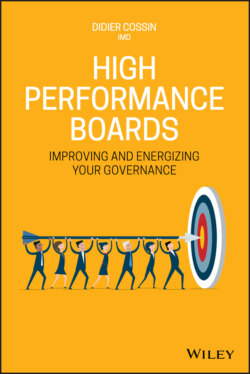Читать книгу High Performance Boards - Didier Cossin - Страница 27
Duty of Loyalty
ОглавлениеConflicts of interest are rampant in today's world. They arise when directors lose impartiality because of either material interest or a conflict of roles. When directors are in a position that may benefit them, or someone close to them, in any way, then they can no longer make impartial decisions; this is a material conflict of interest. A conflict may also result from one director having different roles, so that their obligations to one company are compromised by those to another. Directors who sit on multiple boards may therefore have a potential conflict if two of these organisations form any kind of relationship.
Another source of conflict is self-interest. When directors focus primarily on maintaining their position, comfort, and income rather than on what is best for the company, they are likely to be highly biased. They may also become compliant and not wish to be unpopular. Again, they lose their impartiality.
Sometimes directors fail to acknowledge conflicts of interest – even to themselves. It is critical that directors think about this honestly, because it has a direct impact on board service. All of us are conflicted, and figuring out these conflicts is part of our duty. We explore the four tiers of conflicts of interest facing boards in Chapter 13. A good rule of thumb is for board members to have a list of their own conflicts of interest: time, money, effort, friends, relationships, financial interests, reputation, social network, and more.
